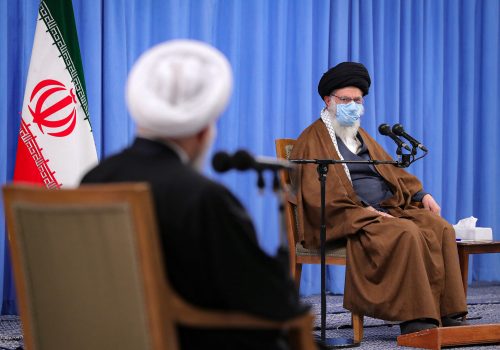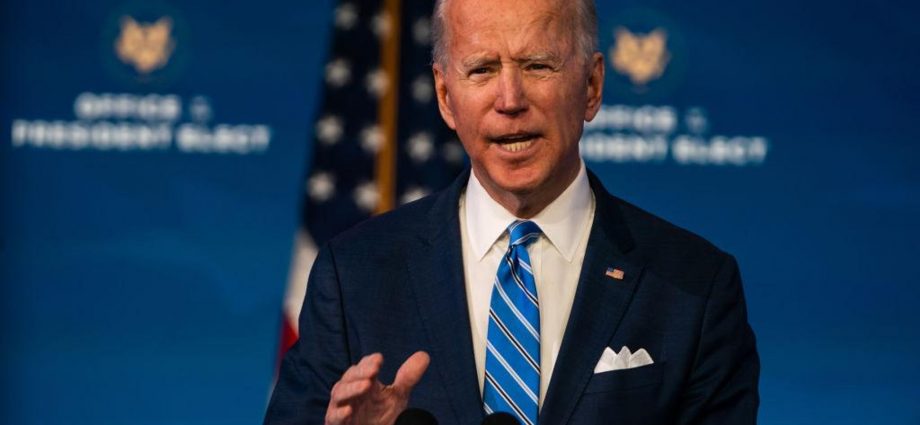Eastern Europe, Asia, or the Middle East – where will an imminent term-defining event take place? Three main points of conflict are brewing as global powers plan to test the US administration’s resolve, in an attempt to create new rules in a Covid-ridden, unstable world.
As president Biden entered office, he wasted no time to advance his agenda and selectively reverse Trump’s legacy. Starting on the eve of his election with 17 new executive orders, he has continued with almost 40 orders to date. From immigration to the environment, economics, and health – the president has been extremely industrious, demonstrating the high level of experience and preparedness of a veteran and seasoned politician – hitting the ground running.
The President has already halted the construction of the border wall by terminating the national emergency declaration used to fund it, reversed the Trump administration’s restrictions on US entry for passport holders from seven Muslim-majority countries, stopped the United States’ withdrawal from the World Health Organization, directed FEMA to create federally-supported community vaccination centers, set the foundation for $15 minimum wage, and elevated climate change as an essential element of US foreign policy and national security.
However, the world, unstable and beaten by a year of ongoing pandemic, has not stopped to applaud the diligent president, and three main conflict points are currently brewing. Each one enmeshed in its own battles of power and survival, and each with a potential to undermine world order: Eastern European tensions with Russia as recently demonstrated in the Black Sea, Asian tensions in the Pacific (and the unexpected coup in Myanmar), and Iran’s nuclear and ballistic weapons program.

Each one of the global players is testing the waters for US reaction. After the Trump era of inconsistency and unclear policy, which held the world on its toes, a new consistent and rational president can quickly find his policy in need of adaptation and revision when the rubber hits the road.
Eastern Europe – Russian Echoes of the Ukrainian Crisis
In February 2014, the pro-West faction of Ukraine’s Parliament took over the government and overthrew Russian ally, Viktor Yanukovych. Russia supported local rebels who took over city halls and police stations throughout eastern Ukraine. In March, the crisis erupted when Russian special forces occupied Ukraine’s Crimean peninsula. The United States and the EU reacted by extended economic sanctions against Russia. Ukraine’s desire to open its markets to the EU and to collude with U.S. companies to develop its natural gas reserves were perceived by Russia as huge threats to its economy. Since then, relations between the United States and Russia have continued to deteriorate with the ongoing Ukraine conflict. Efforts to reach a diplomatic settlement have failed.
Since 2014, there has been continuing unrest with sporadic incidents erupting between Russian and Western forces in the Black Sea. The latest friction occurred and On January 21st, as U.S. Air Forces in Europe and Air Forces Africa participated in a Joint All-Domain Command and Control (JADC2) event with assets from U.S. Special Operations Command Europe, U.S Naval Forces Europe/U.S. 6th Fleet, U.S. Army Europe, and Africa, U.S. Strategic Command, and the Romanian Air Force, in international waters and airspace in and around the Black Sea. A Russian Su-24Fencer combat jet flew low over the destroyer USS Donald Cook, while missile-toting Su-30SM Flanker multirole fighters and mobile coastal defense missile systems undertook high-profile drills, and Ukrainian media confirmed reports that the Russian military had worked out “electronic firing” on U.S. warships in the western Black Sea. According to the data presented, the Russian military used the Ball missile systems and, according to other information, the bastion long-range BRK, when it met the U.S. Navy at the entrance to the Black Sea.
Myanmar – A New Pressure point
Myanmar’s transition from military rule a decade ago was heralded as an important victory for the US in China’s backyard. Before the transition Western countries imposed severe sanctions against Myanmar, banning investment, trade and travel. China then moved to fill the void, supporting the military elite through investments and becoming the country’s primary trade partner. Since then Myanmar opened its doors to diplomatic and commercial ties with the West, and the sanctions imposed were gradually eased, and eventually eliminated.
On Monday the military seized power in a surprising coup, detaining Aung San Suu Kyi and other civilian leaders, and declared that the military’s top general was running the country.

The takeover stands as a unexpected test for the US, which needs more to to reaffirm past global alliances. As a main foreign policy concept President Biden does not think the US should act alone in the world, and he much needs time to regain former coalition alliances such as Europe and NATO, in order to project Western policy. Coming against the backdrop of a deepening U.S.-China rivalry, The coup pits the foreign-policy strategies of the two powers against each other. And it thrusts Myanmar on to the front lines of an increasingly tense geopolitical competition for global leadership.
President Biden pressed the Myanmar military to relinquish power and raised the possibility of imposing sanctions. Biden said he would reach out to partners in the region—an effort that tests his promise to marshal the world’s democracies against authoritarian states.
According to white houses experts, the dilemma for the new Biden administration is twofold: additional U.S. sanctions will have only a marginal impact on the Burmese military, which is largely immune to unilateral U.S. measures, and secondly, China is only too happy to step in and support the Burmese military as part of its ongoing effort to maximize its influence in Southeast Asia.
The Middle East – Iran’s Upcoming Elections
Iran will hold elections in June 2021. President Hassan Rouhani faces strong opposition from conservatives and is slated to end his two terms. He has little to show his constituents in terms of achievements in the past years. Iran’s economy has buckled under the burden of US sanctions imposed by the Trump administration. Last September its currency reached its lowest ever value against the US dollar. Iran is also facing the Mideast region’s largest and deadliest outbreak of the coronavirus, with over 358,000 registered cases, including 20,643 deaths.
Iran is one of the most important states in the Middle East, occupying a large and pivotal physical space. Its population is about the same as Turkey’s, not far behind Egypt’s and much greater than that of any of the other Arab states. Celebrating more than 2500 years of history since the empire of Cyrus the Great, Iranians view history as a part of a larger picture, that of hostile outside powers playing on local weakness and division. Some of those threats have grown into direct compromises of Iranian sovereignty and independence. Recent history includes the British and Soviet occupation of Iran during World War II and the American and British overthrow of Prime Minister Mohammad Mossadegh in 1953. The Trump administration’s fostering of a U.S.-Israeli-Saudi axis falls in as the latest chapter in that history.
While Iran has believed the U.S. has sought its demise since the founding of the Islamic Republic in 1979, the notion of a major U.S. attack on the country or its allies has become increasingly palpable over the past year. President Biden has, perhaps too quickly, promised to move to rejoin the nuclear deal with Iran so long as Iran also comes back into compliance.
Iran, while posing as aggressive and irrational, is a fundamentally rational albeit a reactive player to external events. While Iran may not seem deliberately confrontational, it tends to pursue strategies and tactics that are apt to make a miscalculation and confrontation more likely. Some of these are cultural and some regime-specific. The result is a mixed record of pragmatism and opportunism.
Iran hegemony employs three pillars of deterrence – the nuclear program, ballistic missile capability, and its capability to smartly and slyly collude with Shia powers in the middle east such as Hezbollah and the Houthis in order to inflict unproportionable pain and defense expenses from its rivals. These defiant capacities are Iran’s main playing cards in exchange for ease of economic sanctions without losing its pride, however, during this regime’s lifetime, they will never be surrendered. They are too central to the conservative ruling party and are part of their inherent essence. Even during the famous nuclear deal they were selectively put on a backburner, but where never stopped.
It was the six world powers, known as the P5+1 (China, France, Germany, Russia, the United Kingdom, and the United States) who reached a controversial nuclear deal in 2015 that limited Iran’s nuclear program and enhanced monitoring in exchange for relief from nuclear sanctions. Prior to that, Iran had been engaged in efforts to acquire the capability to build nuclear weapons for more than two decades. Former US president Trump unilaterally withdrew America from the nuclear deal in 2018, saying it was not strict enough and did not address Iran’s ballistic missile program and regional aspirations.
Amid severe economic hardship in Iran, the country’s Supreme Leader Ayatollah Ali Khamenei last month left no doubt that he supports efforts to ease economic pressure on his country and get the U.S. sanctions removed. “If the sanctions can be lifted, we should not delay even one hour. …If the sanctions can be lifted in the right, wise … and dignified way, this must be done,” he told government officials.
Despite what would seem as acute hardships Iran is not hesitant to extend its resources towards destructive goals it deems as important. On January 4th, Iranian lawmakers have proposed legislation that would obligate the government to initiate steps for the “destruction” of Israel by 2040. When confronted with questions Iran’s representatives say their goal is to destroy the “Zionist regime”. Other goals stated in the parliamentary initiative are “expelling the United States” from the Middle East, “taking hard revenge” and “confronting Israeli actions”. Iran’s foreign policy is controlled by Supreme Leader Ali Khamenei and the current hardliner-dominated parliament loyally follows his wishes. In the proposed legislation that will go to discussion on the floor and possibly a vote, two specific steps are mentioned regarding ‘Israel’s destruction’. First, is “breaking Gaza’s siege” by supplying “essential goods”, for free if needed. The second is to offer “infrastructure and services” to implement the right of return for Palestinians. In other areas, lawmakers propose to continue sending “aid to Yemen”, where Iran has been supporting the Houthi rebels and to friendly forces in Iraq and elsewhere. The legislation, if passed, could add to existing tensions and alarm Western governments who have demanded the Islamic Republic reduce its interventions in regional countries
While the Trump administration’s endgame was clear, however yet unsuccessful, to bring about an internal overthrow of the regime, Biden’s administration endgame is not clear. It would be naive to expect the Iranian regime to relinquish their three pillars of deterrence, and as history has shown they never did. The Iranian regime will not give up its regional aspirations, or perhaps more important, the required hardliner narrative needed for the internal control of its population. The other option. which is bad news for the Middle-East, is to keep a blind Obama-esque eye to the region while flouting it with finely crafted wordsmanship and diplomacy
The current administration’s policy on Iran is expected to be a point of contention between the new US administration and Israel. Israeli officials have voiced strong objections to the US rejoining the nuclear deal, and have also issued threats against Iran in recent weeks. As the middle east is gradually beginning to stabilize with long anticipated peace agreements such as the Abrahams records, Iran is playing a continuously destabilizing role.
The key, as with all major policies in Iran, is Ayatollah Khamenei, now 81. He regards America as a doomed country in “political, civil and moral decline.” He went along with the nuclear deal because it promised significant economic benefits from the lifting of sanctions, and now apparently regards his skepticism about the United States as confirmed by Mr. Trump’s withdrawal from the pact.

In January this year, li Akbar Salehi, head of the Atomic Energy Organization of Iran, announced that Iran will resume enriching to 20 percent uranium-235 “as soon as possible” at the Fordow facility. A defiant Iran informed the International Atomic Energy Agency (IAEA) of its boost in enrichment, adding that it must do so to comply with recent legislation passed by the Iranian parliament.
President Biden, much like his democrat predecessor, sets America’s goal to be a global leader and a promoter of western values. However, continuing the previous democratic administration’s policy, which he is was deeply involved in, will peg him in a predictable position, while requiring unavailable time to recruit world leaders for current support – leaders dismayed with the previous administration’s international conduct. Three experienced global players – China, Russia, and Iran – are carefully sizing the president in order to etch new relations and balance of power in a manner befitting themselves.
The events culminating to the next conflict, in terms of diplomatic and military actions, have already begun in a paced manner. An incident in the Black Sea, a Pantsir missile shot by the Hezbollah at an Israeli UAV, a hijacking of a South Korean vessel, and other “low profile” events. These are set to test the waters, and will gradually increase in audacity and scope commensurate with the US administration response.
President Biden will probably not get 100 days of grace, and his reaction to imminent warmongering events will shape his policy for years to come, and perhaps create a new world order. In an aching and unstable political order, the president’s term-defining event will inevitably occur in the near future, with a high probability of unfolding in one of the theatres mentioned above.


Comments are closed, but trackbacks and pingbacks are open.